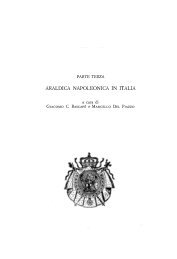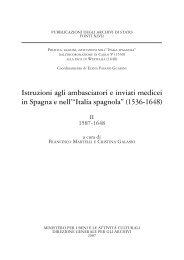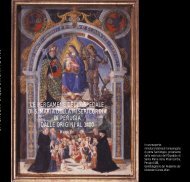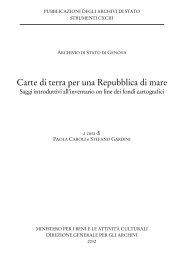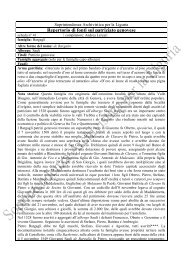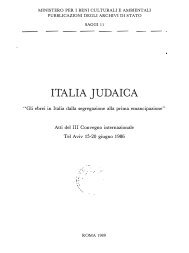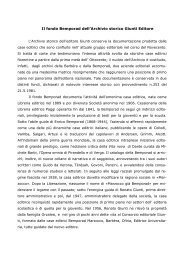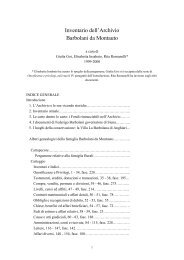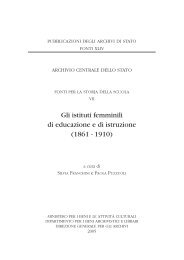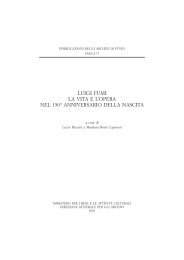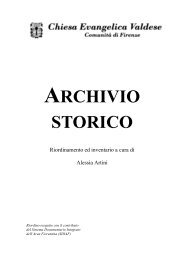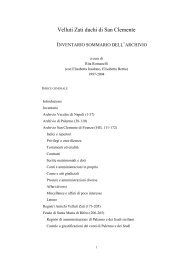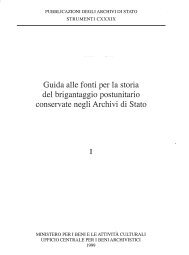ITALIA JUDAICA - Direzione generale per gli archivi
ITALIA JUDAICA - Direzione generale per gli archivi
ITALIA JUDAICA - Direzione generale per gli archivi
You also want an ePaper? Increase the reach of your titles
YUMPU automatically turns print PDFs into web optimized ePapers that Google loves.
168<br />
Abraham Melamed<br />
monides and Gersonides, the Jewish Sages, as a whole, generally refrained<br />
from the serious study of history. This was the result of an extreme interpretation<br />
of the commandment: :"1,,, c, t::l n:"T, the duty to devote one's<br />
entire time to the study of the Torah. Some of them even came to the conclusion<br />
that one should not overly prolong one's prayer, since this might lead to losing<br />
time and distracting one's mind. This was even truer for the study of history,<br />
which they considered to be part of the external wisdoms whose study should be<br />
strictly limited. - N''iV jT:"T li,.,,,li n.v-, ,:"1,, N''iV c T 'l' co,n "<br />
.. c'.v,n 105 .<br />
De' Rossi could not, of course, accept this opinion. As a Renaissance man,<br />
he considered ali human studies to be an integràl part of the Torah. This<br />
included of course the study of history, which he emphasized for its usefulness<br />
in understanding human affairs.<br />
The Sages, in his opinion, were wrong in their assumption that history<br />
is o ne of the external wisdoms, which should no t be studi ed for their own<br />
sake. Thus, they refrained from the serious study of history, a fact which<br />
gave rise to the many errors he found in their references to historical events 106•<br />
Like some of his Italian contemporaries, who did not hesitate to criticize<br />
traditional authorities - classica! and ecclesiastica! - in their search for the<br />
historical truth, de' Rossi also ended up in sharp disagreement with traditional<br />
Jewish authorities, in his endeavour to understand the true course of Jewish<br />
history. The fi.erce attacks inflicted, as a result, upon his Meor Einaim, is a<br />
cultura! phenomenon which, though imbedded in the Jewish tradition, is equivalent,<br />
in many respects, to the sharp criticism in which Catholic Counter<br />
Reformation circles viewed the « profane » history written by the followers<br />
of Machiavelli and Tacitus. Por them, like some of de' Rossi's Jewish criticizers,<br />
the only meri t of writing history ( that is, if i t has any meri t a t all!) is<br />
to teach moral lessons and defend religious dogma 107•<br />
105 A. DE' Rossi, Meor Einaim . .. cit., pp. 255-256.<br />
106 Ibid., p. 256: f'N .l:ltilì't:N '"l1N:::l:::l 1''"lN.i:- 1h.liN '"li'' '"l!VN :-Ti:-N:-t l:l''"l:::l.,;, ??::1 "<br />
lì1M'C' ':::l;"T'"l ?N l:l'1l!l •n?::1 .,;::? ;"T'"l1ti:"T i'Ol.':::l l:l''"l1'"lt:l1 l:l''"lj?1C' ?"1 l:lti1':-T? l:lN N?l!ln;,? 1?<br />
'"l1l!lO:: '"l1:.ti' 11-1 :-Tmv 11'N o:-T'l!l? N.lll"' .o'"lj? c•i:-1v? V'"lNV :"! ?v nm'"l::l nN''"li'1 i'?1n<br />
« .;,m:-T n1M'IV:"! :-T';" tiC' 1l'N. Compare also to Ibn Zacuto's apology for writing history,<br />
in the preface of his Sefer Yuhaisn, A. A. NEUMAN, The Shebeth Yehudah ... cit. 257 and<br />
to Ibn Verga's praise to the Christians for their historical writing. S. lBN VERGA, Shebeth<br />
Yehudah ... cit., p. 11, A. A. NEUMAN, The Shebeth Yehudah ... cit., p. 258, n. 7. See also the<br />
contemporary approach of Jewish society to the writing of history, Y. H. YERUSHALMI,<br />
Clio and the Jews ... cit., p. 631.<br />
107 A. DE' Rossi, Meor Einaim ... cit., eh. 28. S. W. BARON, Azariah de' Rossi's Attitude<br />
... cit., p. 21. On this issue in Italian historiography of the <strong>per</strong>iod, and especially<br />
the examples of Patrizzi and Sarpi, see G. SPINI, The Art of History ... cit., pp. 100-105;<br />
W. J. BouwSMA, Tree Types ... cit., pp. 306-312. Baron, although he tends to deemphasize<br />
the influence of Renaissance historiography upon de' Rossi, stili admits that it influenced<br />
The Perception of Jewish History in Italian Jewish Thought 169<br />
De' Rossi's attempt to write Jewish history aimed at the knowledge of<br />
historical truth was a new phenomenon in the development of Jewish historiography.<br />
The awareness of the novelty of this attitude in the writing of Jewish<br />
history was common among his contemporaries. They not only has a new<br />
approach to Jewish history, but were also clearly conscious of it. This is vividly<br />
expressed in Joseph ha'Kohen's preface to his History of the Kings of France<br />
and the Ottoman Empire. Echoing the Biblical -Song of Deborah, ha'Kohen<br />
presents himself as the fi.rst J ewish historian since Y osippon, w ho for him, i t<br />
should be remembered, was Josephus Flavius of the First Century: « The<br />
chroniclers ceased in Israel, they ceased, until I, Joseph, did arise, until I did<br />
arise, a chronicler in Israel! » 108• From Josephus (Flavius) to Joseph (ha'Kohen)<br />
there was no true historian in Israel!<br />
Gedalya Ibn Yahia never went as far as de' Rossi in his utilization of<br />
the new methodology of Renaissance historiography. Nor did he dare to so<br />
boldly criticize Rabbinical authorities. He also refrained from mentioning<br />
de' Rossi by name, presumably out of fear of being ostracized by de' Rossi's<br />
many critics. Basically he continued to write within the familiar and accepted<br />
mould of the « chain of tradition » 109• Hovewer, Ibn Yahia based many of<br />
his historical observations on de' Rossi's findings, and sometimes copied him<br />
verbatim. He did this to such an extent that Zunz accused him of literary<br />
plagiarism. Ibn Yahia clearly imitated de' Rossi's methods of historical research.<br />
Like him, when dealing with a particular subjetc, he collected all available<br />
sources, and compared them including non-Jewish sources, in order to better<br />
understand the historical past. Although the value of his historical inquiry is<br />
much inferior to that of de' Rossi's, it stili reflects in many respects the influence<br />
of Renaissance historiography 110 •<br />
Until now, we have considered the new criticai approach to Jewish historical<br />
sources. In Luzzatto's refutation of Tacitus' libels against the ancient Jewish<br />
people, we fi.nd the new criticai approach to classica! texts applied to a non-Jewish<br />
historian's observations on Jewish history.<br />
In the concluding remarks of his discussion on Tacitus, Luzzatto asserted<br />
that the least benefi.t the reader could gain from reading his criticism of Tacitus<br />
was the understanding that no authority - great and ancient though it might<br />
be - was solely sufficient to prove the truth of the matter, «il vero cimento<br />
him in various aspects, like in developing source criticism, mentioned above (S. W. BARON<br />
A:-ariah de' R ssi's . Historical Method ... cit., p. 209, 217-219), and the method of writin<br />
d!s 7 onnected histoncal essays adopted by his Italian contemporaries from classica! models<br />
(tbtd., pp. 210-211), an issue which is not dealt with in my study.<br />
108 J. HA'CoHEN, Sefer Dibrei ha'Y amim ... cit., the preface. Quoted by Y. H. YERUSHAL-<br />
MI, Clio and the Jews ... cit., pp. 622-633. See also A. DAVID, Mifalo ... cit., pp. 65-67; In.,<br />
R. Gedalya Ibn Yahia ... cit., p. 63.<br />
109 Y. H. YERUSHALMI, Clio and the Jews ... cit., p. 628.<br />
110 A. DAVID, R. Gedalya Ibn Yahia ... cited.



